Dentures Allen
Regain Your Best Smile After Serious Tooth Loss

When you think about dentures, negative stereotypes may come to mind. However, with today's impressive technology, many of the old stigmas surrounding dentures are no longer true. In fact, dentures look and feel more real than ever before. They are also a lot more comfortable than you might think! If you are looking to regain your best smile after serious tooth loss, custom dentures from Advanced Dental Care of Allen may be the restorative dentistry treatment for you.
Why Choose Advanced Dental Care of Allen for Dentures?
- Highly Experienced, Detail-Oriented Prosthodontist
- Top-Quality Materials and Advanced Technology
- Regain a Beautiful, Confident, and Functional Smile
Who Is a Good Candidate for Dentures?

Extensive tooth loss can seriously affect both your health and daily quality of life. You may hesitate to smile in public, and your face may have a somewhat “sunken” appearance because there are no teeth to keep your cheeks in place. Clearly enunciating some words may be challenging, and you might not be able to eat all of your favorite foods.
If you are plagued by any such issues, and your gums are in good health, dentures in Allen may be able to help. They are ideal for many individuals who have lost all or most of their teeth.
Types of Dentures
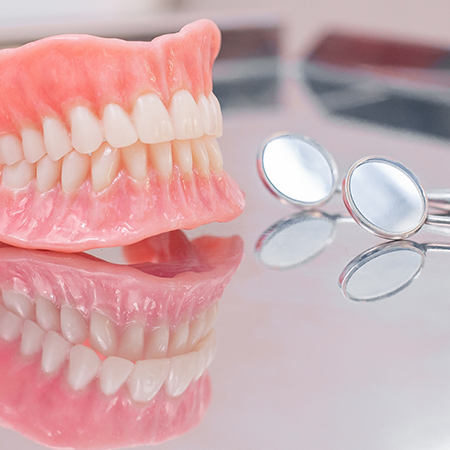
There are a few different types of dentures. When you visit Dr. Kar for your consultation, he will carefully consider your circumstances before he recommends the type of prosthetic that would work best for you. Here is a brief overview of the most popular forms of dentures:
Partial Dentures
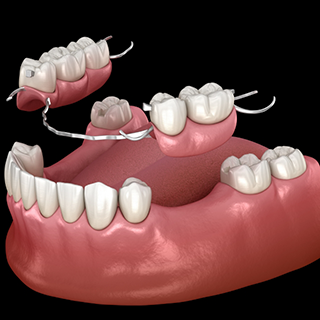
Partial dentures are used when some natural teeth remain; they are designed to fit in with your natural dentition, kind of like a puzzle piece that goes exactly where it is needed. They feature an acrylic base, along with resin or porcelain teeth. Metal or acrylic attachments help them remain secure in the mouth.
Full Dentures
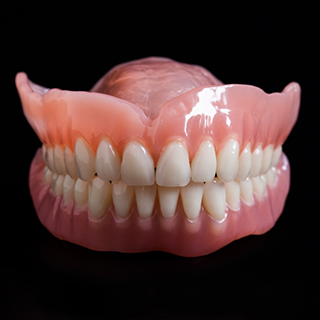
Full dentures are used to replace all of the teeth in either the upper or lower dental arch (or both). They usually have an acrylic base that is stays in place using natural suction or adhesive. They are custom-designed to rest as comfortably as possible on the gums.
Implant Dentures
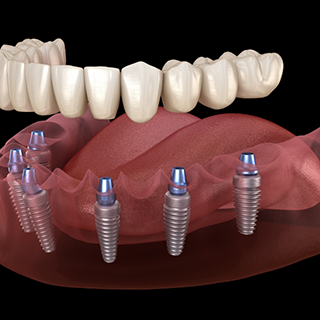
Implant dentures do not rest on top of the gums. Rather, they are anchored in place via prosthetic tooth roots, which Dr. Kar surgically implants beneath the gumline. The implants provide an extremely sturdy base for the teeth that get attached to them so patients are able to enjoy the strongest, most natural-feeling tooth replacement possible.
The Benefits of Dentures

Some of the most outstanding benefits of dentures include:
- They are completely custom-made for each unique patient.
- They bear a strong resemblance to natural teeth.
- They can equip you to eat a wide variety of nutritious (and delicious!) foods.
- They can prevent your cheeks from looking hollow so you can be more confident in your appearance.
- They are easy to clean and maintain.
- In most cases, they are very cost-effective and at least partially covered by insurance.
Understanding the Cost of Dentures
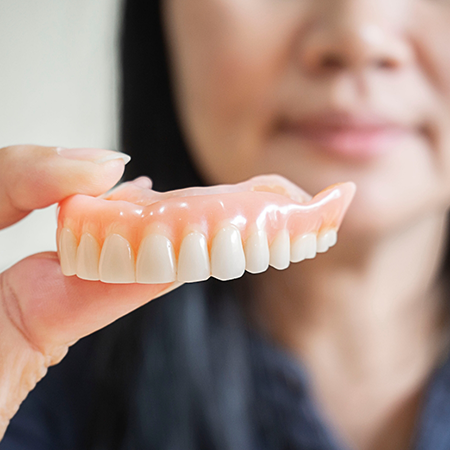
Compared to other forms of tooth replacement, dentures are an inexpensive way to replace multiple teeth. The exact cost is something that can vary from patient to patient, so before you commit to getting dentures, you’ll want to figure out how much you should expect to pay for them. Dr. Kar and the rest of our team can put together a reliable estimate for you and explain the factors that go into the final cost of dentures; we’re also happy to explain how insurance and other options can make paying for your dentures easier.
Factors That Affect the Cost of Dentures
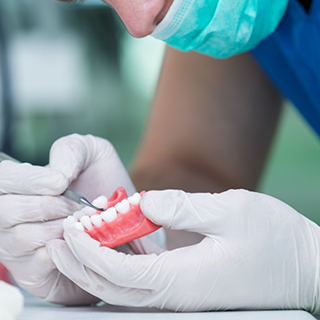
Three major factors can have an impact on how much you pay for your new teeth:
- Preparation: Some people need to have tooth extractions and other treatments performed before they can get dentures. These procedures can add to the overall cost of getting dentures.
- Material of the Base: The base of the dentures (the part that’s colored to match your gums) can be made out of different kinds of acrylic. The type of acrylic used affects the price.
- Material of the Teeth: Denture teeth are normally made from acrylic or porcelain. Like the base, the kind of teeth you get affects the final price.
Are Implant Dentures More Expensive?
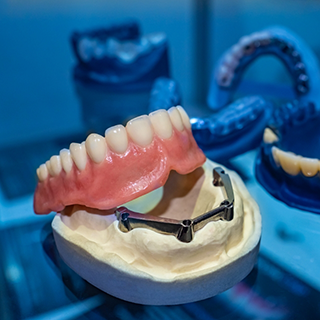
An implant denture is a denture that’s anchored to the mouth with four to eight dental implant posts. Naturally, having dental implants surgically placed in your mouth will add to the cost of your new teeth. It’s well worth the investment, as implant dentures offer many benefits such as:
- A more permanent solution to tooth loss.
- Looking and feeling more natural.
- Letting you eat whatever you want without issue.
- Preventing your dentures from slipping around.
On top of that, while dentures need to be replaced every 7 to 10 years or so, dental implants can last much longer with the right kind of care; this means that they often end up being the more cost-effective choice in the long run.
Does Dental Insurance Cover Dentures?
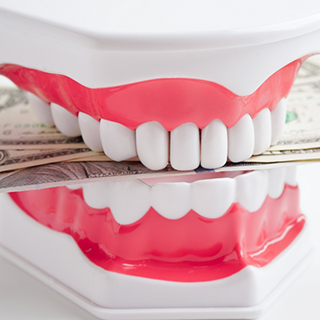
Most dental insurance plans offer coverage for dentures. The coverage is usually around 50% of the total cost, but it depends on which insurance carrier you have. Before you start the process of getting new teeth, you should contact your insurance company to confirm that they can help pay for dentures and what kind of coverage they offer. Our team can clarify any details of your insurance plan that you’re uncertain about.
Other Options for Making Dentures Affordable
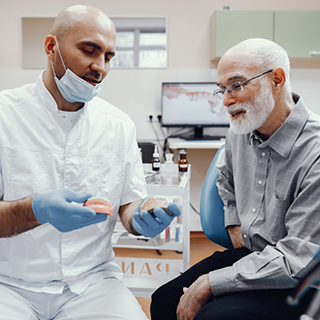
Insurance isn’t your only option for saving money on dentures. Uninsured patients can sign up for our in-house dental savings plan. Among other benefits, you can enjoy a 30% discount on general dentistry procedures such as dentures. We can also help you apply for CareCredit financing. CareCredit offers several different payment plans that let you pay for your dentures in budget-friendly installments.
Denture FAQs
How long will you have to wait to get dentures after your teeth are pulled?
The answer to this question varies from patient to patient. If you get immediate dentures, you’ll be able to enjoy a complete smile on the same day your natural teeth are extracted. However, your prosthetic will require multiple adjustments as time goes on. For conventional dentures, the average wait time after extractions is around 8 weeks, though your wait time could be longer or shorter depending on your circumstances.
If you opt for implant dentures, you might have to wait 4 – 6 months after your implant surgery before you receive your permanent dentures. (However, if you opt for All-on-4 treatment, you will get new teeth immediately after your surgery.)
Can I sleep with my dentures?
When you first get your dentures, you may wear it for 24 hours as you get used to it. Following that, however, it is generally recommended that dentures be removed at night. This gives your gums and jawbone a chance to rest. Removing your dentures is also pivotal for proper oral hygiene. The last thing you want is for harmful bacteria to accumulate beneath them or on the surfaces of your prosthetic teeth. Not only could this harm your oral health, but it could also lead to unpleasant tastes and odors.
Will it hurt to get dentures?
If you must undergo some extractions before you get dentures, you can expect some tenderness in your mouth as your body heals. Most people are feeling much better within a few days to a week. When you first receive your dentures, some soreness in the gums is normal. It may take a few weeks or months for you to get used to wearing and using your prosthetic. Practice and patience are the keys to adjusting. Of course, if you experience any severe or unusual pain related to your dentures, you should seek professional help right away.
What can’t you eat with dentures?
Traditional, non-implant dentures are able to handle most foods, but there are some items that are best avoided. For example, sticky foods like gummy candies might pull your dentures out of place. Foods with small pieces, such as popcorn or bread with seeds on it, pose a threat because those small bits might get stuck around your prosthetic and perhaps even damage it. If you eat hard foods, you must be extra cautious not to bite down on them with your front teeth. Rather, you should move them to your back teeth and distribute them evenly on both sides of your mouth as you chew.
If you would like to enjoy the most varied diet possible, ask your denture dentist in Allen if you qualify for implant dentures. They are much sturdier and stronger than their traditional counterparts.
